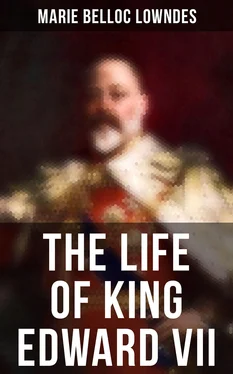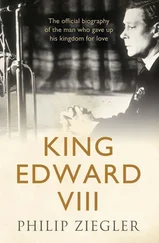On 9th November the Prince Consort put in his diary: “Bertie’s birthday. Unfortunately he is still absent, neither do we hear anything from him.” Great, therefore, was the joy of the Queen and Prince Albert when, on 15th November, they received a telegram from Plymouth announcing the safe arrival of their son. That same evening the Prince of Wales arrived at Windsor Castle, being greeted with the warmest affection by his family and friends.
Queen Victoria showed the most vivid interest in all her eldest son’s many and varied adventures. Both Her Majesty and the Prince Consort were very much gratified by the way in which the Duke of Newcastle had performed his arduous and delicate task, and, after some consultation, it was decided that the Queen should publicly mark her satisfaction by conferring upon the Duke the Order of the Garter.
Chapter VI.
Death of the Prince Consort—Tour in the East
Table of Contents
King Edward’s visit to Germany in the autumn of 1861 is explained by Sir Theodore Martin, in his Life of the Prince Consort , to have been made with another object in view besides that of seeing the military manœuvres in the Rhenish Provinces. It had been arranged that he was to make the acquaintance of the Princess Alexandra of Denmark, who was then on a visit to Germany, with a view to a marriage, should the meeting result in a mutual attachment.
In spite, however, of every precaution to ensure secrecy, until at least the inclinations of the principal parties should have been ascertained, the project leaked out, and even before they met, it was actually canvassed, much to the Prince Consort’s annoyance, in the Continental papers. From these it soon found its way into the English journals, where it met with general approval; but as the meeting, which took place at Speier and Heidelberg on the 24th and 25th of September, ended with the happiest results, no harm was done, though in other circumstances it might have been extremely painful.
“We hear nothing but excellent accounts of the Princess Alexandra,” Prince Albert notes in his diary on the 30th of September, and he adds, with evident satisfaction, that “the young people seem to have taken a warm liking for each other.” On 6th October the Prince Consort, writing to the King of Prussia, says: “Bertie has come back in raptures with his excursion to the manœuvres, and cannot speak sufficiently highly of your kindness to himself, and to all the English officers.” About a week later the Prince Consort was able to write to Baron Stockmar: “The Prince of Wales leaves to-morrow for Cambridge. He came back greatly pleased with his interview with the Princess of Holstein at Speier.… His present wish, after his time at the University is up, which it will be at Christmas, is to travel; and we have gladly assented to his proposal to visit the Holy Land. This, under existing circumstances, is the most useful tour he can make, and will occupy him till early in June.”
The Prince Consort that same autumn went specially to London in order to inspect the alterations that were being made at Marlborough House, which was then being actively prepared as a residence for the Prince of Wales; and on the 9th Queen Victoria wrote in her diary: “This is our dear Bertie’s twentieth birthday. I pray God to assist our efforts to make him turn out well.… All our people in and out of the house came in to dinner. Bertie led me in by Albert’s wish, and I sat between him and Albert.”
Prince Albert paid a hurried visit on 28th November to Cambridge in order to visit the Prince of Wales. The weather was cold and stormy, and he returned to Windsor with a heavy cold.
The next few days were spent by both the Prince Consort and Queen Victoria in considerable anxiety. The seizure of the Trent aroused a great deal of bitter public feeling, and the fact that America was convulsed by civil war did not make the position of Great Britain more easy. The Government adopted a very resolute attitude, and the Prince Consort, instead of allowing himself to be nursed through his feverish attack, spent some hours in composing and writing a draft, on the burning question of the day, to Lord Russell.
The story of those sad days is well known. As time went on, Prince Albert grew slightly worse rather than better, but no real danger was apprehended by those nearest and dearest to him, and Queen Victoria would not hear of having the Prince of Wales summoned, until at last Princess Alice, who behaved with extraordinary fortitude and marvellous self-possession, felt that she must send for her eldest brother on her own responsibility. She accordingly did so, and King Edward was always, up to the day of her death, very grateful to her for her prompt action, because it enabled him to arrive in time to be present at his much-loved father’s death-bed. Although she was herself overwhelmed with bitter grief, it was to the Princess Alice that all turned, for Queen Victoria was so completely overcome that nothing could be referred to her, and it was finally arranged that the Prince of Wales and the Princesses Alice and Helena should accompany their mother to Osborne, where she had consented very reluctantly to go.
The Prince of Wales returned immediately, in order to complete the arrangements for the funeral, and to receive his uncle the Duke of Saxe-Coburg and Gotha, his brother-in-law the Crown Prince of Prussia (afterwards the Emperor Frederick), and the other foreign mourners who were to take part in the last sad ceremony.
The funeral took place on 23rd December, the service being held in St. George’s Chapel, Windsor. The chief mourner was, of course, the Prince of Wales, who was supported, in the absence of Prince Alfred (Duke of Edinburgh), by Prince Arthur. All those present were deeply moved by the grief of the two young princes. They both hid their faces, and after the coffin had been lowered into the vault the Prince of Wales advanced to take a last look and stood for one moment looking down; then, his fortitude deserting him, he burst into a flood of tears, and was led away by the Lord Chamberlain.
Sad indeed were the days that followed. The effect of the Prince Consort’s death on King Edward’s affectionate and sensitive nature was terrible, and those about the Court felt that something must be done to rouse him from his grief.
As we have already seen, the Prince Consort, not long before his death, had assented to his eldest son’s proposal of making a tour in the Holy Land, and it had also been his earnest wish that His Royal Highness should on that occasion be accompanied by the Rev. Arthur Penrhyn Stanley, who had himself already taken a journey to Jerusalem. And so, when the tour was decided upon as a means of rousing the Prince of Wales from his stupor of grief, Queen Victoria made up her mind that she would be guided by her late Consort’s wishes, and General Bruce was commanded to write to Dr. Stanley, but not till he reached Osborne was he actually asked whether he would consent to undertake the responsibility.
Dr. Stanley, though he regarded the proposal with reluctance and misgiving, for he could not bear to leave his aged mother, to whom he was most tenderly devoted, consented to do as Her Majesty wished. It was ultimately arranged that he should meet the Prince at Alexandria, ascend the Nile with him, and accompany him, not only through the Holy Land, but on the Egyptian portion of the expedition.
On 28th February King Edward, accompanied by General Bruce, Major Teesdale, Captain Keppel, and a small suite, was joined by Dr. Stanley, the party at once proceeding to Cairo. “The Prince,” wrote General Bruce to his sister, “takes great delight in the new world on which he has entered, and Dr. Stanley is a great acquisition.” They visited the Pyramids together, and then resumed their voyage, the Prince characteristically persuading Dr. Stanley to read East Lynne , a book which had greatly struck his imagination. When recording the circumstance, Dr. Stanley adds:—
Читать дальше












